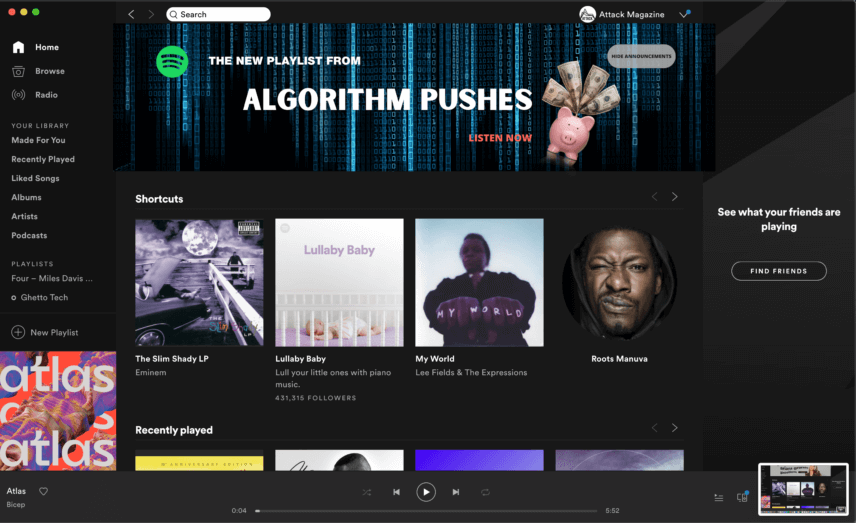Spotify announced their latest mad plan ‘Amplifying Artist Input in Your Personalized Recommendations’ this week. Harold Heath shares some fair and balanced thoughts on why he already hates it.
It’s been a dark year for everyone, not least the music industry. Artists, performers, bands and DJs haven’t worked for months, venues are going to the wall and the whole eco-system of night time employees – from security teams, to runners, stagehands, bar staff, cloakroom staff, sound engineers – are facing the toughest winter perhaps any of us have ever faced.
So it was particularly galling although perhaps not especially surprising that mega multi-million-dollar music platform Spotify chose this moment in history to announce the return of payola. Payola was the use of illegal financial inducements, gifts and, bribes in order to get promotion for a piece of music. It’s as old as the music business itself and has been a problem since music was first able to be recorded. Payola was a system that used the power of money to sidestep old fashioned things like talent, artistry, quality or hard work. It became endemic in the second half of the twentieth century, with bribes and backhanders just another part of the day-to-day running of the industry.


Luckily, those dark days are over. Instead, payola is now being taken out of the backrooms, away from underhand deals and will be performed out in the open, shamelessly. Because this week Spotify beneficently announced that in exchange for a lower royalty rate, they’d give your song an algorithmic push on their platform. Lower royalty rate you say? Yes, lower. Although Spotify famously pays around $0.0032 per stream and has a business model widely believed to financially benefit larger artists on major labels, they are now offering to sell bands and artists access to their own fanbases in exchange for an even lower royalty rate.
So let’s just clarify that shall we. A company which couldn’t exist without artists, labels and music fans, charges labels to host their music and then charges music fans to listen to it, and is now offering to operate a payola system where artists pay them even more money, purely for exposure.
So the labels will pay Spotify. The listeners will pay Spotify. The artists will pay Spotify. You have to admit, they’ve got some front. Perhaps they can add an additional service, maybe for an additional cut in royalties they’ll come round your house and help themselves to the contents of your fridge. Or maybe they’ll introduce a ‘Daylight Robbery’ option for artists, where you just give them your bank details so they can just dip into your account when they need a few more sheets to pay their shareholders.
Spotify is acting like a huge virtual version of that local promoter who’ll offer you an unpaid DJ slot but tell you that you’ll get lots of exposure. Except that Spotify is way worse than that because, in this simile, you also have to pay to play your set, people will have to pay to come and hear you, your wages will be tiny and they’ll be even tinier if the promotor decides to tell anyone that you’re playing there.
The streaming company have said that it’s not actually a lower royalty rate because it will result in more streams, which shows a basic misunderstanding of the concept of counting to rival Donald Trump’s. It’s like they’re asking you to pay more for the paracetamol you’ll need after they punch you in the face.


At the moment Spotify is calling it an ‘experiment’, as though dressing up pay-for-play as an exciting new feature for artists was somehow an interesting avenue of research that they’re innocently pursuing rather than another desperate money grab. The original problem with payola was that it unfairly advantaged those with financial clout – major labels – and it appears that Spotify’s 21st-century payola, let’s call it dismayola, will do exactly the same.
Presumably social distancing and quarantine measures have had a huge impact on Spotify’s web-based music platform that requires no social contact, that must be why they’ve chosen to instigate legal payola. Good on them I say, perhaps next we can bring back other out-moded music industry practices such as using baseball bats to enforce unclear contracts, putting all non-white music into a ‘race music chart’ or getting artists hooked on drugs in order to work them to death, that sort of thing. Bravo Spotify, bravo. Now take my money and shoehorn my precious artistic creation into your Moodbooster Pick-Me-Up Songs and Summer Barbecue Vibes playlist.
Harold Heath is on Twitter.

